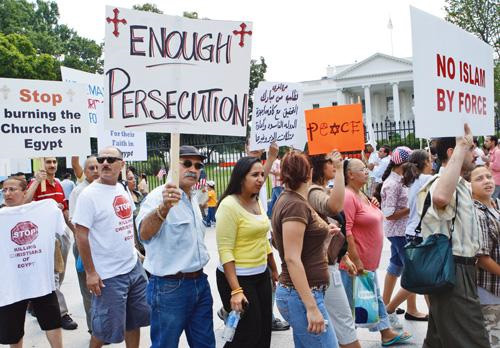Egypt’s Copts Continue to Fear the Future of Egypt

by: Terese Tadros Ibarra*
Coptic Christians in Egypt and other Eastern Orthodox churches in the Middle East and throughout the world celebrated Christmas Eve on Sunday, January 6, 2013. Coptic Christians (or Copts) represent about 10% of Egypt’s population of 84 million, the majority of which are Sunni Muslim. Due to recent incidents of violence against Copts in Egypt, however, most Christmas masses began and ended earlier than the customary midnight mass.
Coptic Christians in Egypt have long suffered discrimination and violence. Under the current regime of the Muslim Brotherhood’s President Mohamed Morsi, the future of Copts remains perilous. The newly enacted Constitution seeks to further polarize Egypt’s minority as it essentially legitimizes religious discrimination by failing to protect freedom of expression and religion. The Constitution also explicitly indicates that the legal code stems from “the principles of Islamic law” and many believe that this language allows for the implementation of Islamic Sharia law.
On October 9, 2011, thousands of protestors gathered in the Maspero section of Cairo to demonstrate against the Egyptian government’s failure to protect Coptic Christians against several deadly attacks on churches which occurred in 2011. To end what were otherwise peaceful protests, the Egyptian military fired at unarmed civilians resulting in the deaths of nearly 30 innocent protestors and injuries to over 200 people. The violent incident came to be known as the Maspero Massacre. To date, not one member of the Egyptian military has been charged or convicted in connection with the killings of Coptic Christians in the Maspero Massacre.
Going into 2013, Copts justifiably fear that their interests are not being represented by Egypt’s new government and Constitution. Likewise, Copts are afraid that if Egypt moves towards operating under Islamic law, the daily activities of all Christians will be stifled. Specifically, Copts fear an impending government mandate forcing Christian women to wear veils in public, which is against the Coptic religion, or worse, that fundamentalists will mob churches to force conversions to Islam as rumored by various media outlets.
Although corruption and greed ousted longtime former President Hosni Mubarak following the revolution that began on January 25, 2011, Copts and secular liberal Egyptians are truly uncertain of what the future holds for Egypt under the reign of President Morsi and his allies, the Muslim Brotherhood. Despite the uncertainty, however, one thing is clear: Copts in Egypt continue to live in fear and repression.
* Terese Tadros Ibarra is an associate at BOILA PC.





